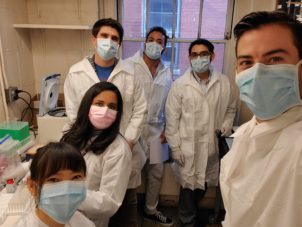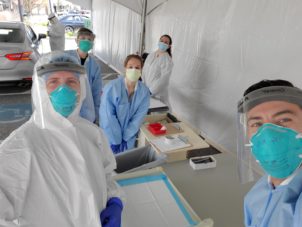 Even if the coronavirus pandemic had never happened, there’s no doubt that Dr. Tyler Miller, Ohio State ’10, would someday make a great contribution to medical science. A pathologist, he’s been researching treatments for brain cancer since 2011, and currently works as a clinical pathology resident at Massachusetts General Hospital in Boston.
Even if the coronavirus pandemic had never happened, there’s no doubt that Dr. Tyler Miller, Ohio State ’10, would someday make a great contribution to medical science. A pathologist, he’s been researching treatments for brain cancer since 2011, and currently works as a clinical pathology resident at Massachusetts General Hospital in Boston.
That research is now on hold, however. Since March, all of Miller’s energy has been focused on efforts to develop and verify the effectiveness of coronavirus antibody tests. Antibodies are proteins in the blood produced in response to being infected with a foreign pathogen, and they typically provide at least short-term immunity from a future infection by the same pathogen. Coronavirus antibodies can be detected seven to 21 days after a person contracts the virus.
In response to this novel coronavirus, several pharmaceutical and biotech companies have raced to develop tests to detect these antibodies. The sense of urgency created by the pandemic led to bypassing typical testing timelines and regulatory procedures in order to get the tests to hospitals and labs as quickly as possible. However, the speed with which they were created and rush to make them available also resulted in questions about just how effective the tests actually are.
Because of his position as a senior clinical pathology resident at the country’s top research hospital, Miller was tasked with helping answer these questions. Since mid-March, he’s spent 80-plus hour weeks evaluating tests and compiling data as part of a team trying to identify the tests that can most accurately detect coronavirus antibodies.

“When this all started, we knew that antibody tests were going to be important. Because we’re at one of the premier research hospitals in the U.S. and because of our affiliation with Harvard, there were a lot of companies that were interested in working with us and sent us their tests to evaluate,” Miller explained. Team members evaluated tests developed in China, Korea, Singapore and Germany, as well as a test they developed in-house at Mass Gen.
In the first phase of the study, the research team evaluated tests to see how accurately they identified the specific antibodies associated with COVID-19. Miller said they’ve seen promising results from some of the tests, including the one developed at Mass Gen.
With the number of U.S. infections surpassing 3 million in July, it’s understandable that much of the attention from the media and the public is focused on developing an effective vaccine. But the work Miller is engaged in will also be a game-changer in terms of how the coronavirus will be treated in the years ahead.
“Once we know who has antibodies, then we can study them to see if they get re-infected,” Miller explained. By identifying people who’ve developed antibodies, studies can determine if their cells block re-entry of the virus when exposed again. And those results can be measured against a control group, enabling researchers to compare the potential for infection in people who’ve already had the virus to those who’ve never had it.
There’s widespread belief in the medical community that contracting the coronavirus will make people immune to future infections. Miller believes this is probably true, but cautioned that because we’re dealing with a novel virus, more data is needed. Even if being infected does provide immunity, additional research will be required to determine its duration — short-term or for a lifetime — he noted.
From the lab to the real world
Miller’s involvement is more than just theoretical, it’s also personal. He tested positive for the virus in April and spent two weeks quarantined at home with his family. Fortunately, his case was a mild one. Despite not being able to go to the lab, he continued to analyze test results and direct studies from home. Since recovering, he’s helped present the team’s findings to the mayor of Boston and Mass Gen’s president.
As states continue to stage phased re-openings of businesses and government offices and as the medical community learns more about immunity in those who’ve been exposed, Miller’s work is likely to become important in another way. “Would it be safer for certain workers to return to their jobs?” he mused. “If people knew they had antibodies, and we knew these antibodies were protective against re-infection, would those people be more willing to perform essential tasks that would place them at higher risk for exposure to the virus? For example, healthcare workers who had antibodies might be able to work in the ICU with less risk than colleagues who don’t have antibodies.”
In addition, workers in high-risk categories or who live with someone at high risk might want to know their antibody status in order to decide if they’re comfortable remaining in their jobs or want to seek other employment.
Although years of research lie ahead, Miller is pleased that his team’s efforts have already begun to produce real-world benefits. Mass Gen began using its data to identify areas in the surrounding community that have a high percentage of residents with antibodies.

“In late March, we identified that a disproportionate number of people in the ICU have come from a particular zip code. We went out to that community with one of the antibody tests that showed early promise and found 30 percent of those tested had been exposed. It was one of the first antibody studies in the U.S. and detected the highest percentage of people positive for antibodies in the world at that point. It really brought attention to the number of infections there, and as a result, more resources have been deployed to that area.”
Medicine and brotherhood
Miller looks back fondly on his days as a member of SigEp’s Ohio Gamma chapter at The Ohio State University. He received a Balanced Man Scholarship and later chaired the BMS committee. Some of his best memories are of living in the chapter house his senior year with other senior brothers who had all decided to move into the house to spend time together during their final year of college.
He noted that relationships formed during that time continue to have a strong influence, not just on his personal life, but also on his career. “Many of my closest friends are SigEps from undergrad. Even 10 years later, I talk to many by phone regularly and meet up at least once per year, even though that normally involves a plane flight,” he stated.
Several of his professional mentors are also SigEps, including chapter brother Christopher Alvarez-Breckenridge, ’05. Now a neurosurgery resident at Mass Gen, Alvarez-Breckenridge collaborates with Miller on brain cancer research.
He’s also become good friends with another Boston-area brother who’s a doctor. The two met as undergrads at a cancer research conference and “have collaborated and pushed each other ever since,” he said.
“I imagine my life will always be influenced by my time in SigEp at Ohio Gamma and through my continued relationships with amazing SigEp brothers.”









Leave a Reply